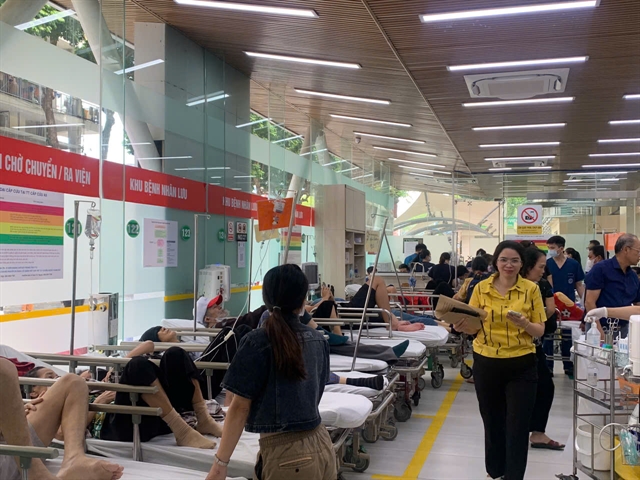 Society
Society


|
| Several infectious diseases are seeing an increase in cases, including measles, whooping cough and rabies. — Photo baochinhphu.vn |
HÀ NỘI — The Ministry of Health has urged provinces and cities to strengthen measures for proactively preventing infectious diseases during the winter-spring season, as several infectious diseases are recording increases in cases, including measles, whooping cough, and rabies.
According to the ministry’s Department of Preventive Medicine, the overall infectious disease situation remains under control, however, some diseases are rising in specific locations.
The cause is attributed to favourable climatic and weather conditions during the winter-spring period, which enabled the spread of infectious diseases, particularly those transmitted via the respiratory tract.
To proactively prevent and control infectious diseases during this season, the department has requested provincial and municipal departments of health to closely monitor the infectious disease situation in their respective areas.
Authorities must carry out effective and regular surveillance including event-based monitoring to promptly detect suspected cases at border checkpoints, within communities and at healthcare facilities.
Particular attention should be given to respiratory infections and severe acute respiratory syndrome caused by viruses. Outbreaks must be addressed promptly to prevent further spread in the community.
The National Institute of Hygiene and Epidemiology and Pasteur Institutes were asked to collect samples for testing, identify disease-causing agents, assess risks and promptly deploy appropriate measures.
Regular vaccination programmes must continue for target groups under the Expanded Immunisation Programme, ensuring progress and coverage targets are met as planned.
Localities must review and manage vaccination records and organise supplementary and catch-up vaccinations for individuals who have not been fully immunised. Campaigns for measles vaccination must also proceed as directed by health ministry.
Provincial and municipal departments of health are instructed to improve patient flow management, ensure effective screening, admission, emergency care and isolation measures, while strictly implementing infection control to prevent cross-infection at medical facilities, especially among high-risk groups such as patients with underlying conditions, the elderly, pregnant women, children and patients in intensive care units.
Departments of agriculture and rural development should co-ordinate with local authorities to enhance proactive surveillance of zoonotic diseases and share information to investigate and handle outbreaks promptly, especially avian flu at border checkpoints and live poultry markets.
Early detection of suspected rabies cases caused by dog and cat bites is also required to ensure timely vaccinations.
The health sector needs co-operate with the education and training sector to disseminate infectious disease prevention in schools, particularly preschools and kindergartens.
Suspected cases must be detected and handled promptly, and effective vaccination campaigns must be implemented in schools.
Schools must ensure food safety, hygiene and clean environment, while enhancing communication on infectious disease prevention and vaccination.
Localities must review and ensure the availability of resources, including funding, medicines, vaccines, equipment and personnel, to meet the requirements for preventing and controlling infectious diseases. — VNS




